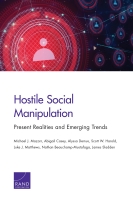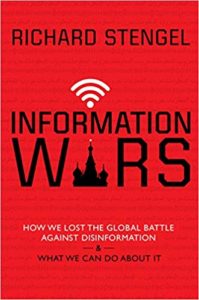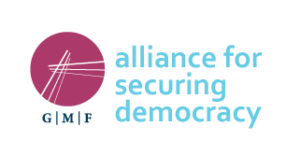
Hamilton 2.0,
As strategic competitors, most notably Russia and China, engage in hostile social manipulation, such as conducting targeted social media campaigns, conspiracy theories, and sophisticated forgeries, democracies urgently need to undertake rigorous research on social manipulation to gain a better understanding of its dynamics, according to a new must-read RAND report.*
Efforts at social manipulation are effective to the degree that vulnerabilities in a society allow them to be effective, say the authors of the report – Hostile Social Manipulation: Present Realities and Emerging Trends. The United States and other democracies may have a limited window of opportunity to develop defenses against this growing threat, highlighting the urgent need to develop a framework to understand the tactics and reach of hostile social manipulation, add the authors – by Michael J. Mazarr, Abigail Casey, Alyssa Demus, Scott W. Harold, Luke J. Matthews, Nathan Beauchamp-Mustafaga, James Sladden.
 Key Findings
Key Findings
The United States is only beginning to examine the techniques and reach of information warfare
- The United States needs an updated framework for organizing its thinking about the manipulation of infospheres by foreign powers determined to gain competitive advantage.
- Leading autocratic states have begun to employ information channels for competitive advantage — plans that remain in their initial stages and that could unfold in several ways.
- Efforts at social manipulation are effective to the degree that vulnerabilities in a society allow them to be effective.
There is as yet no conclusive evidence about the actual impact of hostile social manipulation to date
- There is a critical distinction between the outputs of manipulation campaigns and their outcomes in terms of effects on attitudes or behavior.
The marriage of the hostile intent of leading powers and the evolution of information technology may vastly increase the effectiveness and reach of these techniques over time

RAND
- Leading democracies may have a limited window of opportunity to develop resilience and active defenses against such measures before they become truly dangerous.
Democracies urgently need to undertake rigorous research on social manipulation to gain a better understanding of its dynamics
Recommendations:
- Develop a more formal and concrete framework for understanding hostile social manipulation.
- Fund additional research to understand the scope of the challenge. RTWT
 The United States is losing the fight for what Russians call the “information space,” The Post’s David Ignatius writes. Richard Stengel’s Information Wars: How We Lost the Global Battle Against Disinformation and What We Can Do About It ought to be a wake-up call. The message is that open, democratic societies are in retreat. There’s only one force powerful enough to save the day (one too little mentioned these days), and that’s the readers and viewers who consume information.
The United States is losing the fight for what Russians call the “information space,” The Post’s David Ignatius writes. Richard Stengel’s Information Wars: How We Lost the Global Battle Against Disinformation and What We Can Do About It ought to be a wake-up call. The message is that open, democratic societies are in retreat. There’s only one force powerful enough to save the day (one too little mentioned these days), and that’s the readers and viewers who consume information.
Russia and China are continuing to further invest in disinformation strategies that they believe will influence public opinion in the U.S. and other parts of the world as the U.S. struggles with a strategy to counter the tactics, The Cipher Brief adds.
 The Alliance for Securing Democracy at the German Marshall Fund of the United States has launched Hamilton 2.0,, a new dashboard tracking Russian government-backed information operations online and on state-sponsored broadcast television. The interactive, publicly accessible dashboard captures content from more than 140 diplomatic and media accounts on Twitter, four state-sponsored news websites, RT’s television news broadcasts, and RT America and RT UK’s YouTube channels.
The Alliance for Securing Democracy at the German Marshall Fund of the United States has launched Hamilton 2.0,, a new dashboard tracking Russian government-backed information operations online and on state-sponsored broadcast television. The interactive, publicly accessible dashboard captures content from more than 140 diplomatic and media accounts on Twitter, four state-sponsored news websites, RT’s television news broadcasts, and RT America and RT UK’s YouTube channels.
*Cited sources include the National Endowment for Democracy’s “Issue Brief: Distinguishing Disinformation from Propaganda, Misinformation, and ‘Fake News,’” October 17, 2017.







